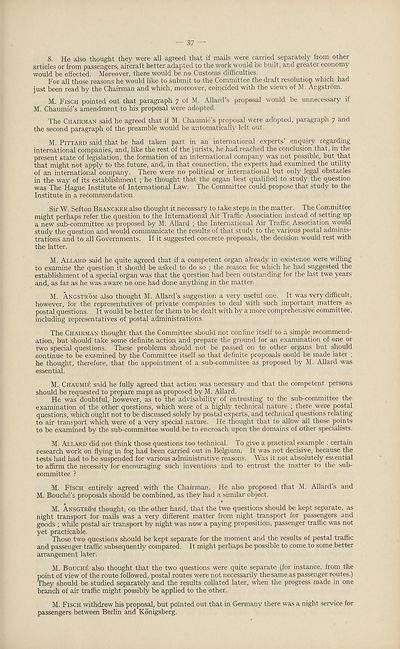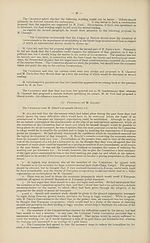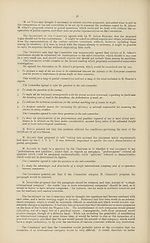Communications and transit > Air transport co-operation committee : minutes of the first session : held at Geneva from July 8th to 12th, 1930
(37)
Download files
Complete book:
Individual page:
Thumbnail gallery: Grid view | List view

— 37
8. He also thought they were all agreed that if mails were carried separately from other
articles or from passengers, aircraft better adapted to the work would be built, and gi eater economy
would be effected. Moreover, there would be no Customs difficulties.
For all those reasons he would like to submit to the Committee the draft resolution which had
just been read by the Chairman and which, moreover, coincided with the views of M. Angstrom.
M. Fisch pointed out that paragraph 7 of M. Allard’s proposal would be unnecessary if
M. Chaurnie’s amendment to his proposal were adopted.
The Chairman said he agreed that if M. Chaumie’s proposal were adopted, paragraph 7 and
the second paragraph of the preamble would be automatically left out.
M. Pittard said that he had taken part in an international experts’ enquiry regarding
international companies, and, like the rest of the jurists, he had reached the conclusion that, in the
present state of legislation, the formation of an international company was not possible, but that
that might not apply to the future, and, in that connection, the experts had examined the utility
of an international company. There were no political or international but only legal obstacles
in the way of its establishment ; he thought that the organ best qualified to study the question
was The Hague Institute of International Law. The Committee could propose that study to the
Institute in a recommendation.
Sir W. Sefton Brancker also thought it necessary to take steps in the matter. The Committee
might perhaps refer the question to the International Air Traffic Association instead of setting up
a new sub-committee as proposed by M. Allard ; the International Air Traffic Association would
study the question and would communicate the results of that study to the various postal adminis¬
trations and to all Governments. If it suggested concrete proposals, the decision would rest with
the latter.
M. Allard said he quite agreed that if a competent organ already in existence were willing
to examine the question it should be asked to do so ; the reason for which he had suggested the
establishment of a special organ was that the question had been outstanding for the last two years
and, as far as he wras aware no one had done anything in the matter.
M. Angstrom also thought M. Allard’s suggestion a very useful one. It was very difficult,
however, for the representatives of private companies to deal with such important matters as
postal questions. It would be better for them to be dealt with by a more comprehensive committee,
including representatives of postal administrations.
The Chairman thought that the Committee should not confine itself to a simple recommend¬
ation, but should take some definite action and prepare the ground for an examination of one or
two special questions. These problems should not be passed on to other organs but should
continue to be examined by the Committee itself so that definite proposals could be made later ;
he thought, therefore, that the appointment of a sub-committee as proposed by M. Allard was
essential.
M. Chaumie said he fully agreed that action was necessary and that the competent persons
should be requested to prepare maps as proposed by M. Allard.
He was doubtful, however, as to the advisability of entrusting to the sub-committee the
examination of the other questions, which were of a highly technical nature ; there were postal
questions, which ought not to be discussed solely by postal experts, and technical questions relating
to air transport which were of a very special nature. He thought that to allow all those points
to be examined by the sub-committee would be to encroach upon the domains of other specialists.
M. Allard did not think those questions too technical. To give a practical example : certain
research work on flying in fog had been carried out in Belgium. It was not decisive, because the
tests had had to be suspended for various administrative reasons. Was it not absolutely essential
to affirm the necessity for encouraging such inventions and to entrust the matter to the sub¬
committee ?
M. Fisch entirely agreed with the Chairman. He also proposed that M. Allard’s and
M. Bouche’s proposals should be combined, as they had a similar object.
M. Ansgtrom thought, on the other hand, that the two questions should be kept separate, as
night transport for mails was a very different matter from night transport for passengers and
goods ; while postal air transport by night was now a paying proposition, passenger traffic was not
yet practicable.
Those two questions should be kept separate for the moment and the results of postal traffic
and passenger traffic subsequently compared. It might perhaps be possible to come to some better
arrangement later.
M. Bouche also thought that the two questions were quite separate (for instance, from the
point of view of the route followed, postal routes were not necessarily the same as passenger routes.)
They should be studied separately and the results collated later, when the progress made in one
branch of air traffic might possibly be applied to the other.
M. Fisch withdrew his proposal, but pointed out that in Germany there was a night service for
passengers between Berlin and Kdnigsberg.
8. He also thought they were all agreed that if mails were carried separately from other
articles or from passengers, aircraft better adapted to the work would be built, and gi eater economy
would be effected. Moreover, there would be no Customs difficulties.
For all those reasons he would like to submit to the Committee the draft resolution which had
just been read by the Chairman and which, moreover, coincided with the views of M. Angstrom.
M. Fisch pointed out that paragraph 7 of M. Allard’s proposal would be unnecessary if
M. Chaurnie’s amendment to his proposal were adopted.
The Chairman said he agreed that if M. Chaumie’s proposal were adopted, paragraph 7 and
the second paragraph of the preamble would be automatically left out.
M. Pittard said that he had taken part in an international experts’ enquiry regarding
international companies, and, like the rest of the jurists, he had reached the conclusion that, in the
present state of legislation, the formation of an international company was not possible, but that
that might not apply to the future, and, in that connection, the experts had examined the utility
of an international company. There were no political or international but only legal obstacles
in the way of its establishment ; he thought that the organ best qualified to study the question
was The Hague Institute of International Law. The Committee could propose that study to the
Institute in a recommendation.
Sir W. Sefton Brancker also thought it necessary to take steps in the matter. The Committee
might perhaps refer the question to the International Air Traffic Association instead of setting up
a new sub-committee as proposed by M. Allard ; the International Air Traffic Association would
study the question and would communicate the results of that study to the various postal adminis¬
trations and to all Governments. If it suggested concrete proposals, the decision would rest with
the latter.
M. Allard said he quite agreed that if a competent organ already in existence were willing
to examine the question it should be asked to do so ; the reason for which he had suggested the
establishment of a special organ was that the question had been outstanding for the last two years
and, as far as he wras aware no one had done anything in the matter.
M. Angstrom also thought M. Allard’s suggestion a very useful one. It was very difficult,
however, for the representatives of private companies to deal with such important matters as
postal questions. It would be better for them to be dealt with by a more comprehensive committee,
including representatives of postal administrations.
The Chairman thought that the Committee should not confine itself to a simple recommend¬
ation, but should take some definite action and prepare the ground for an examination of one or
two special questions. These problems should not be passed on to other organs but should
continue to be examined by the Committee itself so that definite proposals could be made later ;
he thought, therefore, that the appointment of a sub-committee as proposed by M. Allard was
essential.
M. Chaumie said he fully agreed that action was necessary and that the competent persons
should be requested to prepare maps as proposed by M. Allard.
He was doubtful, however, as to the advisability of entrusting to the sub-committee the
examination of the other questions, which were of a highly technical nature ; there were postal
questions, which ought not to be discussed solely by postal experts, and technical questions relating
to air transport which were of a very special nature. He thought that to allow all those points
to be examined by the sub-committee would be to encroach upon the domains of other specialists.
M. Allard did not think those questions too technical. To give a practical example : certain
research work on flying in fog had been carried out in Belgium. It was not decisive, because the
tests had had to be suspended for various administrative reasons. Was it not absolutely essential
to affirm the necessity for encouraging such inventions and to entrust the matter to the sub¬
committee ?
M. Fisch entirely agreed with the Chairman. He also proposed that M. Allard’s and
M. Bouche’s proposals should be combined, as they had a similar object.
M. Ansgtrom thought, on the other hand, that the two questions should be kept separate, as
night transport for mails was a very different matter from night transport for passengers and
goods ; while postal air transport by night was now a paying proposition, passenger traffic was not
yet practicable.
Those two questions should be kept separate for the moment and the results of postal traffic
and passenger traffic subsequently compared. It might perhaps be possible to come to some better
arrangement later.
M. Bouche also thought that the two questions were quite separate (for instance, from the
point of view of the route followed, postal routes were not necessarily the same as passenger routes.)
They should be studied separately and the results collated later, when the progress made in one
branch of air traffic might possibly be applied to the other.
M. Fisch withdrew his proposal, but pointed out that in Germany there was a night service for
passengers between Berlin and Kdnigsberg.
Set display mode to:
![]() Universal Viewer |
Universal Viewer | ![]() Mirador |
Large image | Transcription
Mirador |
Large image | Transcription
Images and transcriptions on this page, including medium image downloads, may be used under the Creative Commons Attribution 4.0 International Licence unless otherwise stated. ![]()
| League of Nations > Communications and transit > Air transport co-operation committee : minutes of the first session : held at Geneva from July 8th to 12th, 1930 > (37) |
|---|
| Permanent URL | https://digital.nls.uk/194043828 |
|---|
| Shelfmark | LN.VIII |
|---|
| Description | Over 1,200 documents from the non-political organs of the League of Nations that dealt with health, disarmament, economic and financial matters for the duration of the League (1919-1945). Also online are statistical bulletins, essential facts, and an overview of the League by the first Secretary General, Sir Eric Drummond. These items are part of the Official Publications collection at the National Library of Scotland. |
|---|---|
| Additional NLS resources: |
|

